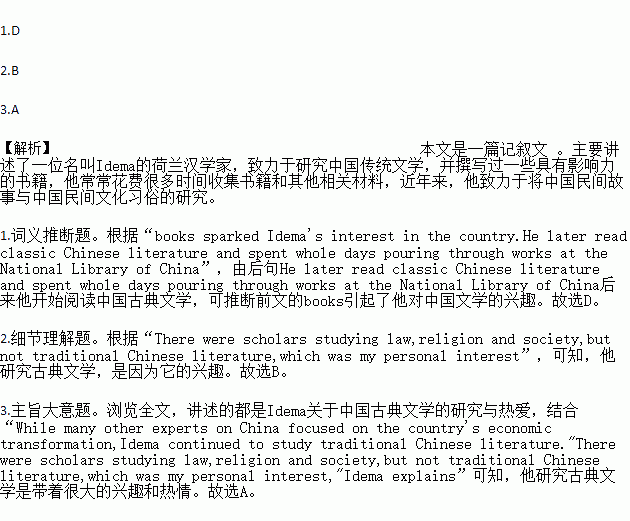题目内容
Idema,a Dutch Sinologist(汉学家),has served as the director of the Chinese Languages and Cultures Department at Leiden University of the Netherlands and was also director of Harvard's Fairbank Center for East Asian Research.He has studied ancient Chinese plays,novels and literature,and has authored or translated a number of influential books published in English and other languages.
The 70-year-old Dutch Sinologist recalled his half-century-long romance with Chinese culture during a recent visit to Beijing.As a child,the vivid descriptions of China in Nobel and Pulitzer Prize-winner Pearl S.Buck’s books sparked Idema's interest in the country.He later read classic Chinese literature and spent whole days pouring through works at the National Library of China.
While many other experts on China focused on the country's economic transformation,Idema continued to study traditional Chinese literature."There were scholars studying law,religion and society,but not traditional Chinese literature,which was my personal interest,"Idema explains.
Finding reference books for his research,especially regional publications,used to be a huge challenge,and Idema used to spend a lot of time collecting books and other materials during visits to China.Now it is much more convenient with the Internet.
Idema usually chooses less-known subjects for his research and tries to get firsthand materials.In recent years, he has devoted himself to translating Chinese folk tales and writing about Chinese folk society and folk culture.
"Traditional Chinese culture is a passion.I have been studying it for 50 years and will continue to do so,"says the retired professor.
1.What does the underlined word "sparked" in Paragraph 2 mean?
A. Increased. B. Broke.
C. Performed. D. Aroused.
2.Idema concentrated on traditional Chinese literature because .
A. he wanted to show he was different from others
B. he was interested in traditional Chinese literature
C. traditional Chinese literature is easier to study than other fields
D. he could benefitted a lot from the traditional Chinese literature
3.What may be the best title for the text?
A. A Passion for Chinese Culture B. The Life of Idema
C. Idema's Visit to China D. The Personal Hobby

